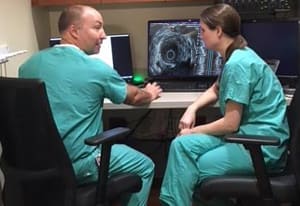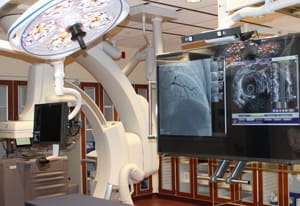Helping Carotid Artery Patients

Middlesex Health’s vascular surgeons are using the Diagnostic & Interventional Suite at Middlesex Hospital to help patients with carotid artery disease.
The suite, which was renovated in 2016, allows the highly skilled surgeons to perform complex procedures that have traditionally been done at larger, tertiary hospitals, such as transcarotid artery revascularization (TCAR).

Dr. Bart Muhs, Middlesex’s Vascular Surgery Department chief, and Dr. Megan Shue recently began performing this minimally invasive procedure at Middlesex. Dr. Shue previously performed this procedure as part of a research study during her residency at Indiana University School of Medicine. Transcarotid artery revascularization helps people with carotid artery disease, which can often lead to strokes in patients if not treated properly.
Carotid artery disease occurs when plaque development gradually narrows the carotid artery, one of the main arteries that delivers blood to the brain. This can increase the risk of stroke, which is a very serious medical issue.
The transcarotid artery revascularization procedure involves a small incision made just above the collarbone. This incision exposes the carotid artery, and a soft, flexible sheath is placed directly into the artery and connected to a system that reverses the flow of blood away from the brain to protect against fragments of plaque that might come loose during a vascular procedure. The blood is filtered and returned through a second sheath placed in the femoral vein located in the thigh.

This system allows balloon angioplasty and stenting to be performed while blood flow is reversed. Once a stent is placed to stabilize plaque in the carotid artery, blood flow to the brain returns to normal.
Until recently, this procedure, which is a less invasive way of addressing these medical issues, had never been performed at Middlesex. It is now available to patients because Middlesex Health continues to invest in technology and always looks to improve the service it offers.
What to know about carotid artery disease
- Carotid artery disease usually develops slowly.
- The first sign of carotid artery disease is often a stroke or a transient ischemic attack, a temporary shortage of blood flow to your brain.
- Treatment can include lifestyle changes, medication and surgery.
- Factors that can increase your risk of getting carotid artery disease are high blood pressure, tobacco use, diabetes, high blood-fat levels, family history, age, obesity, sleep apnea and lack of exercise.
More Stories
Protect Those Eyes on the Sky
While a solar eclipse is a momentous occasion, it's something eye experts say you need to enjoy safely.
Tips From The Mayer Center
In recognition of Autism Acceptance Month, Middlesex Health's The Mayer Center shares tips for parents of children who may be on the autism spectrum.